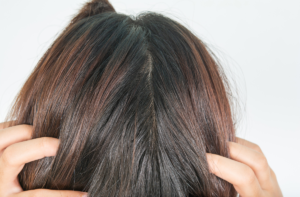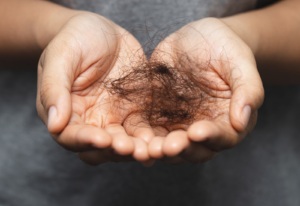Menopause is a significant stage in a woman’s life, marking the end of her reproductive years. Alongside the myriad of hormonal changes that occur during this transition, many women also experience hair loss or thinning. Understanding the causes behind menopausal hair loss and exploring potential solutions is crucial for women during this phase of life.
Causes of Hair Loss in Menopause
Hormonal Changes
Hormones play a fundamental role in regulating hair growth and loss. During menopause, a woman’s body experiences a decline in estrogen and progesterone levels, while testosterone levels may remain relatively stable or even increase. This hormonal imbalance can lead to a condition called androgenetic alopecia, or female pattern hair loss, characterized by thinning of the hair on the scalp.
Telogen Effluvium
Telogen effluvium is another common cause of hair loss during menopause. This condition occurs when a significant number of hair follicles prematurely enter the telogen (resting) phase of the hair growth cycle. As a result, excessive shedding of hair may occur, leading to noticeable thinning or even bald patches on the scalp.
Stress and Lifestyle Factors
Stress, poor nutrition, and certain lifestyle habits can exacerbate hair loss during menopause. These factors include:
- Chronic Stress: Chronic stress can disrupt the normal hair growth cycle and contribute to increased shedding.
- Nutritional Deficiencies: Inadequate intake of essential nutrients, such as vitamins and minerals crucial for hair health, can impair follicle function and lead to hair loss.
- Smoking: Smoking has been linked to hair loss and can negatively impact hair growth and quality.
- Excessive Alcohol Consumption: Alcohol consumption may also negatively affect hair growth and quality, contributing to hair loss.
Genetic Predisposition
Genetic factors play a significant role in hair loss, and women with a family history of female pattern baldness may be more susceptible to experiencing hair thinning or baldness during menopause.
Medication Side Effects
Certain medications commonly prescribed during menopause, such as hormone replacement therapy (HRT) or medications for managing menopausal symptoms, may have side effects that include hair loss. It’s essential to discuss potential side effects with a healthcare provider when considering medication options during menopause.
Thyroid Disorders
Thyroid disorders, such as hypothyroidism or hyperthyroidism, can disrupt hormone levels in the body and contribute to hair loss. Women experiencing menopause may be at increased risk of developing thyroid issues, further exacerbating hair loss.
Solutions for Menopausal Hair Loss
Consultation with a Hair Restoration Professional
The first step in addressing menopausal hair loss is seeking guidance from a qualified hair restoration and replacement professional. These experts specialize in diagnosing the underlying causes of hair loss and recommending personalized treatment plans tailored to each individual’s needs. By conducting a comprehensive evaluation of your scalp and hair, a hair restoration specialist can determine the most appropriate course of action to restore your hair’s fullness and vitality.
Balanced Diet
A balanced and nutritious diet rich in vitamins, minerals, and essential nutrients is essential for maintaining healthy hair growth during menopause. Focus on incorporating foods that support hair health, such as:
- Salmon: Rich in omega-3 fatty acids, which promote scalp health and support hair growth. Try grilled salmon fillets with a squeeze of lemon or baked salmon seasoned with herbs and spices.
- Spinach: Packed with iron, vitamin A, vitamin C, and folate, all of which contribute to healthy hair growth. Enjoy spinach in salads, smoothies, or sautéed with garlic and olive oil.
- Greek Yogurt: High in protein and vitamin B5 (pantothenic acid), which support hair follicle health and growth. Enjoy Greek yogurt with fresh berries and a drizzle of honey for a nutritious snack or incorporate it into smoothies and parfaits.
- Sweet Potatoes: Loaded with beta-carotene, which the body converts into vitamin A, essential for promoting scalp health and hair growth. Try roasted sweet potato wedges seasoned with herbs and spices or mashed sweet potatoes as a side dish.
- Eggs: A great source of protein and biotin, which are crucial for hair growth and strength. Enjoy eggs boiled, scrambled, or poached for a nutritious breakfast or incorporate them into salads and sandwiches.
Incorporating these hair-healthy foods into your diet can provide essential nutrients to support optimal hair growth and minimize menopausal hair loss. Experiment with different preparation methods to add variety and flavor to your meals while promoting overall hair health during menopause.Top of Form
Hair Restoration or Replacement Options
Depending on the severity and underlying cause of hair loss, various treatment options may be recommended. These options include:
- Hair Transplant Surgery: Hair transplant surgery is a procedure that involves transplanting healthy hair follicles from donor areas, typically the back or sides of the scalp, to thinning or balding areas on the scalp. This technique offers a permanent solution for menopausal hair loss and can yield natural-looking results.
- Non-Surgical Hair Restoration: Non-surgical hair restoration options provide alternatives to surgical procedures. These options may include:
- Topical Treatments: Topical treatments, such as minoxidil (Rogaine), are applied directly to the scalp to stimulate hair growth and slow down hair loss.
- Low-Level Laser Therapy (LLLT): LLLT involves the use of low-level laser light to stimulate hair follicles and promote hair growth. This option can be used in combination with other hair restoration methods for the best results.
- Platelet-Rich Plasma (PRP) Therapy: PRP therapy utilizes the patient’s own blood plasma, rich in growth factors, to stimulate hair follicles and promote hair growth. This treatment is often used in conjunction with other hair restoration techniques.
Non-Invasive Solutions
For women seeking non-surgical alternatives to hair restoration, a range of options are available, such as:
- Wigs and Hairpieces: Wigs provide instant coverage for thinning or balding areas, allowing individuals to regain confidence in their appearance. These non-permanent solutions offer versatility and customization to suit individual preferences.
- Hair Extensions: Hair extensions are a non-surgical option for enhancing hair volume and length. These extensions are attached to existing hair to create a fuller, more voluminous look, blending seamlessly with natural hair for a natural appearance.
- Hair Systems: Hair systems offer semi-permanent solutions for individuals experiencing hair loss. These custom-made systems are designed to mimic the appearance of natural hair, providing a seamless and undetectable result.
Conclusion
Menopausal hair loss can be a distressing experience for many women, but effective solutions are available. By understanding the underlying causes of hair loss and exploring appropriate treatment options, women can regain control over their hair and restore their confidence and self-esteem. Working with a qualified hair restoration professional is essential in developing a personalized treatment plan tailored to each individual’s needs and goals. Whether opting for surgical hair restoration or non-surgical alternatives, women can achieve natural-looking results and embrace their beautiful, natural hair once again.
Contact Eldorado Hair Restoration
Navigating menopausal hair loss can be overwhelming, but you don’t have to face it alone. At Eldorado, we understand the emotional toll that hair loss can take and are dedicated to helping women regain their confidence and self-esteem.
Our team of experienced hair restoration professionals specializes in providing personalized solutions for menopausal hair loss. From comprehensive consultations to advanced treatment options, we are committed to helping you achieve the full, healthy hair you desire.
Contact Eldorado Hair Replacement Center today to schedule a consultation and take the first step towards reclaiming your confidence and embracing your beautiful, natural hair.




